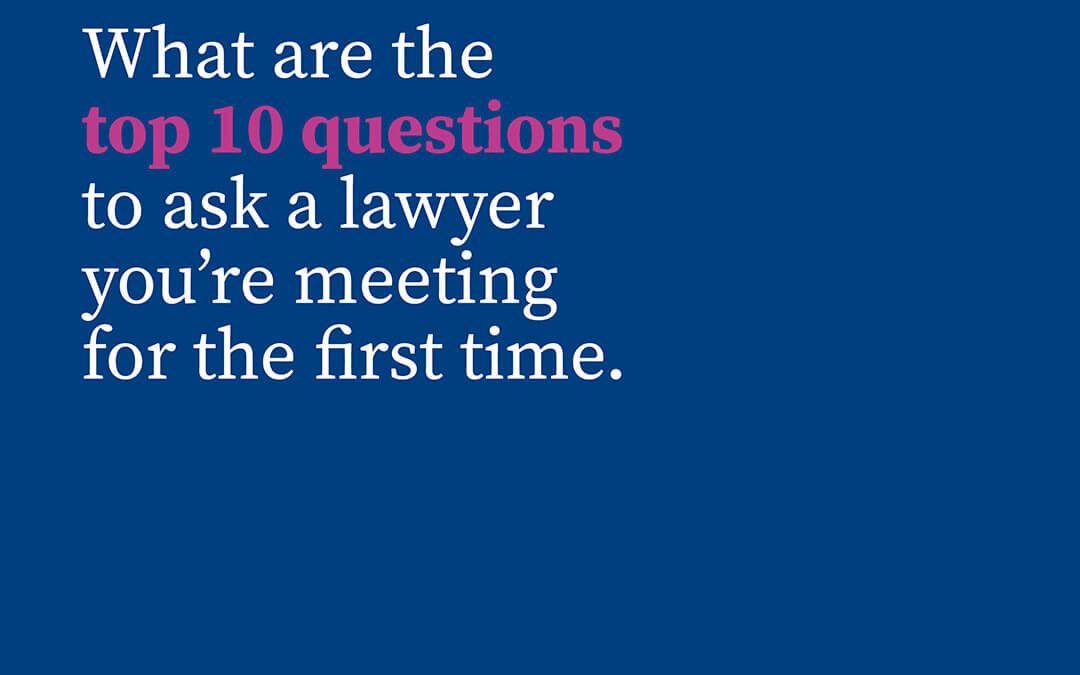Lawyers will often provide a low-cost consultation to discuss the details of your situation and give you an opportunity to ask some basic questions about the attorney. This meeting should not only help you decide whether to go forward with a lawyer in general, but also whether you should proceed with this lawyer. If you later decide to hire the lawyer, you will go into a more detailed discussion of your case and ask more specific questions along the way.
Generally speaking, you’ll want to have a list of questions in mind to ask during the meeting. Also, you should feel comfortable enough asking questions that relate to the lawyer’s expertise, experience, fees, special knowledge, and management of the case.
1. How long have you practiced law?
There’s, of course, no right answer to this one. A more experienced lawyer can serve as a more confident guide, but even the budding attorney hungry for that first case could pass with flying colors. It’s simply important to know whether or not you’re dealing with someone who knows what they’re doing. Also make sure you know what areas of law they work with the most.
2. What Types of Cases Do You Manage?
You’ll want to know what kind of cases they manage to see if your particular case will be a good fit. And, ultimately the attorney will also want to handle a case in which they have experience.
In many areas of law, all lawyers will charge a similar percentage of your winnings for their attorney fees. With that said, why not go with someone who has experience with your specific type of case?
3. Who’s Your Typical Client?
Before you wonder why I’ve included this question when it sounds like the previous question, know this: business and individual are two different types of clients. If you’re an individual looking for representation, you’ll want a lawyer that works specifically with individuals and not companies.
4. How Many Similar Cases Have You Taken On?
Now is not the time to act shy. Feel free to ask about the attorney’s track record, such as the number of cases won or settled, for example.
5. Other than a law degree, what kind of special training or knowledge do you have that might apply in my situation?
Some cases, like DUI and patent cases, require specialized training and knowledge for effective representation. Be sure to inquire whether your case fits into that category.
6. What are your attorney fees and costs, and how are they billed? Will a portion or all of my case be handled by paralegals or legal assistants? If so, ask about reduced costs.
This step is obviously an important one. You’ll want to know whether you can afford the lawyer’s services and how you will be required to pay. This is also the time to ask about payment options and how often, and under what circumstances, you will be billed.
7. What is your approach or philosophy to winning or representing a case?
In short, you’re asking the lawyer how they will win your case. This will define the kind of attorney you want on your side. Some cases are straightforward. Others can get pretty cutthroat. If you’re among the latter, having an attorney who can “go for the jugular” might best suit you.
8. Are there other ways for solving my legal problem?
Just because you’re consulting an attorney doesn’t mean you have to hire them. There’s nothing wrong with asking if there are any alternatives for solving your legal problem, such as arbitration or mediation. A good attorney will generally inform you if your case can be handled through other less expensive and time consuming means.
9. How will you let me know what’s happening with my case?
Communication is essential. How often you’ll hear from your attorney will determine how satisfied you are with the progress. Find out if you’ll be receiving phone calls, texts, or emails, and how often.
10. Finally, what is the likely outcome of my case?
Generally speaking, it is fair game to ask the attorney whether you have a good chance of winning your case. You are not looking for the “right” answer, just an honest one. For instance, if you’re facing an uphill battle in, let’s say, a nasty divorce situation, you’ll want to know up front from the attorney so you can prepare yourself for what lies ahead. If you’ve interviewed a few lawyers, you’ll also develop a sense of whether a lawyer just wants to get paid versus a lawyer who actually cares about you and your case.
Finding the Right Lawyer for You
Asking these questions should give you general knowledge of a specific lawyer’s experience and skill-level, and whether the lawyer is a good fit for you.
If you’re interested in taking the next step of speaking with a lawyer, consider Philip Boni of Resolute Legal Ltd.
Philip has been a resident of the Cayman Islands for 30 years and has built an outstanding reputation for listening to the client’s needs, understanding the components of their issue, managing their expectations and working within their budget – delivering the best results possible.

